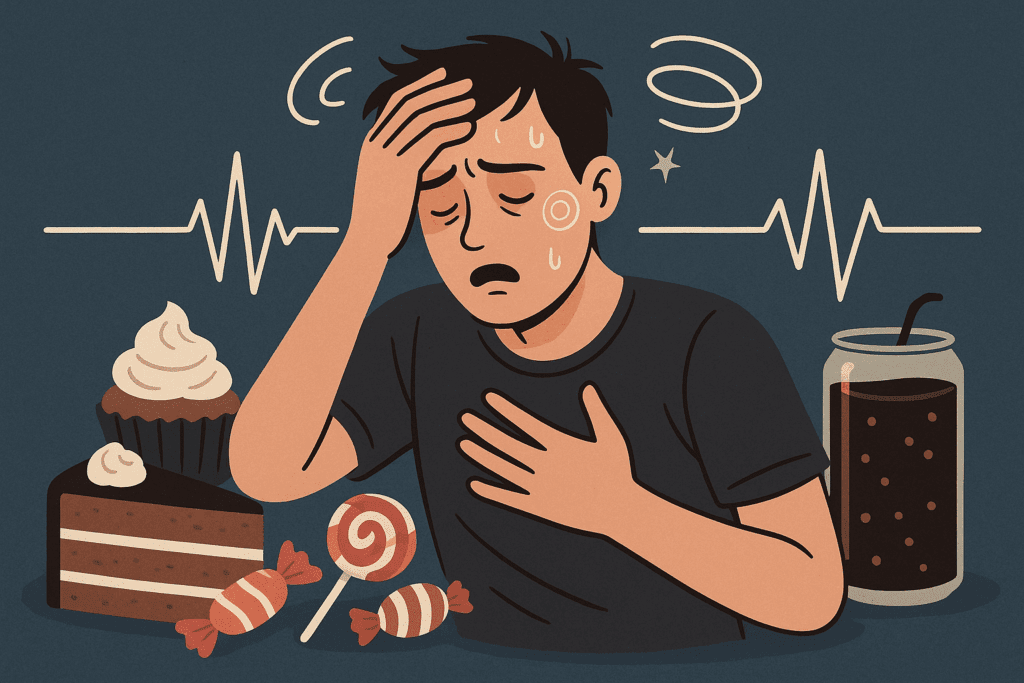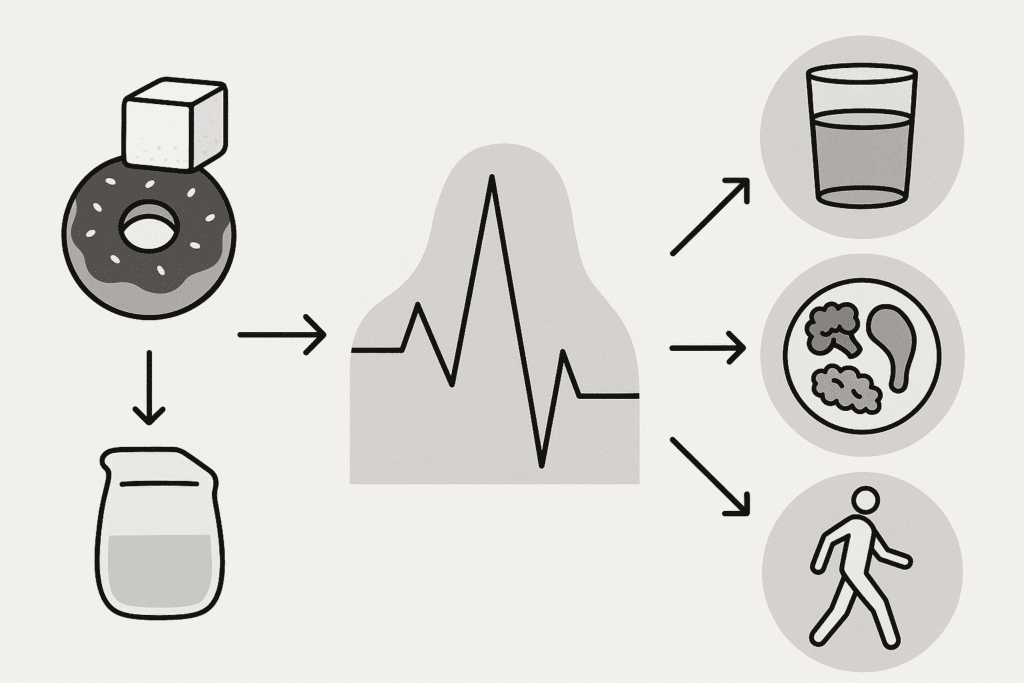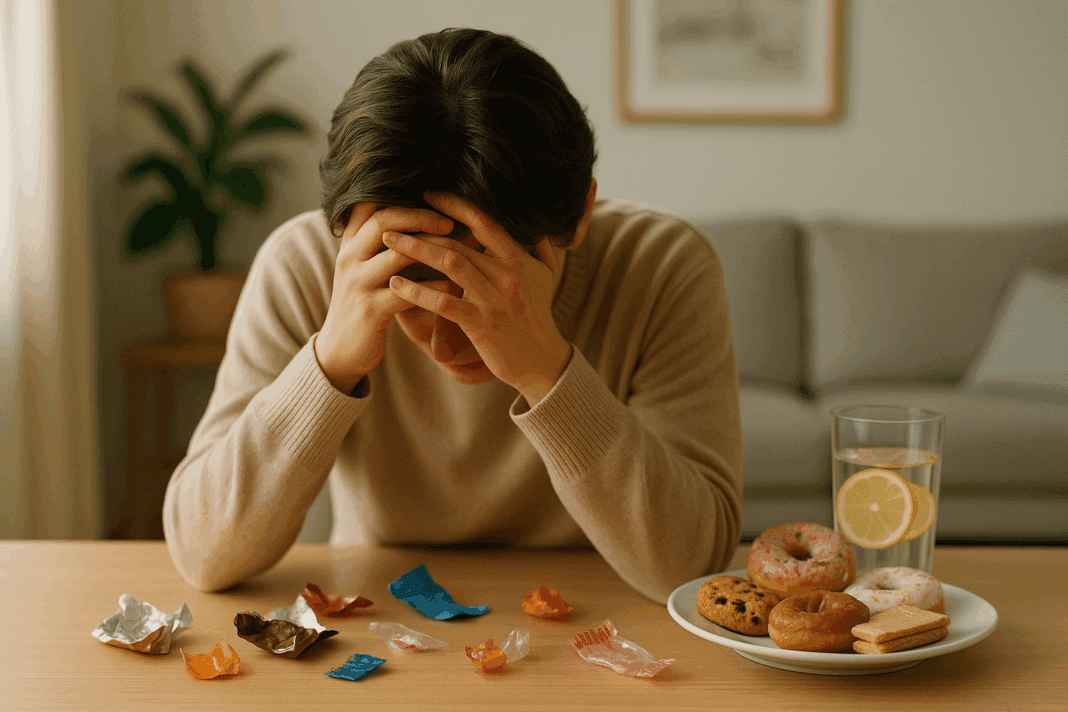It happens to the best of us. Whether it’s a holiday indulgence, a late-night dessert binge, or simply a misjudged portion of a sweetened snack, consuming too much sugar can leave your body and mind feeling completely off-balance. You may feel sluggish, irritable, or wired—followed by a sudden crash. In these moments, many people ask the same thing: what to do after eating too much sugar. While a single high-sugar episode won’t necessarily derail your health, how you respond can make all the difference in how quickly you recover and whether you fall into a pattern of overconsumption.
Understanding the physiological effects of sugar, recognizing the signs of overindulgence, and implementing immediate and long-term recovery strategies are essential steps toward restoring equilibrium. This guide offers expert advice on how to wear off a sugar rush, how to know you ate too much sugar, and what to do to support your body naturally. It also answers common questions like can you overdose on sugar and how to avoid long-term consequences of sugar binges. With a thoughtful and informed approach, you can manage sugar overload with confidence and prevent future episodes.
You may also like: Why Am I Craving Sweets All of a Sudden? Expert-Backed Reasons and How to Stop Sugar Cravings Naturally

How to Know You Ate Too Much Sugar
Recognizing the early warning signs of sugar overload is the first step in regaining control. After a heavy intake of sugary foods, you may initially feel a burst of energy—commonly referred to as a “sugar high” or “sugar rush.” This is due to the rapid spike in blood glucose levels as your body absorbs the simple sugars. While this surge may feel invigorating at first, it’s typically followed by an equally abrupt crash. Fatigue, brain fog, and irritability often set in within an hour or two, signaling that your blood sugar has dropped quickly after peaking.
Physically, you might notice bloating, nausea, or even light-headedness. Sugar can also act as a mild diuretic, leading to increased thirst and more frequent urination as your body tries to flush out the excess glucose. Headaches, shakiness, and mood swings are other common indicators. If these symptoms appear shortly after eating sweets or processed carbs, it’s a good sign that your body is struggling to handle the sugar load.
Behavioral symptoms are equally telling. A sudden craving for more sweets, even after feeling full, may indicate a blood sugar imbalance. Difficulty focusing, sudden anxiety, or feeling unusually tired despite having just eaten are additional clues. Once you learn how to know you ate too much sugar, you can better anticipate what your body needs next—and take swift, supportive action to recover.

Understanding the Effects of a Sugar Rush
To know what to do if you ate too much sugar, you need to first understand what’s happening inside your body. When you consume sugar, your digestive system breaks it down into glucose, which enters your bloodstream. This causes your blood sugar to spike, prompting your pancreas to release insulin. Insulin helps your cells absorb glucose, converting it into energy. But when there’s too much sugar at once, your body floods with insulin—sometimes overshooting the mark and causing blood sugar to plummet.
This sharp drop leads to the infamous sugar crash. Your body, now deprived of that rapid fuel, sends out signals for more sugar to restore balance. This creates a cycle of cravings and consumption that can be hard to break. While the term “sugar overdose” may sound extreme, the body does react strongly to sudden sugar surges, especially if they are frequent or paired with a sedentary lifestyle, poor sleep, or stress.
Repeated exposure to sugar highs can lead to longer-term issues like insulin resistance, chronic inflammation, and fatigue. Your brain also plays a role here: sugar triggers dopamine release, activating the brain’s reward center and reinforcing the desire to consume more. This is why sugar can feel addictive and why it’s so difficult to eat “just a little.” Knowing how to wear off sugar rush symptoms effectively can help interrupt this cycle and restore equilibrium before it becomes a habit.

Can You Overdose on Sugar?
While the phrase “can you overdose on sugar” is commonly used in casual conversation, it’s worth exploring from a medical standpoint. In healthy individuals, the body has mechanisms in place to manage the occasional influx of sugar. However, if someone consumes an extremely large amount in a short time—particularly from refined sources like candy, soda, or baked goods—acute symptoms can occur. These may include vomiting, rapid heartbeat, dizziness, and severe fatigue. Though it’s rare, such episodes can be serious, especially in people with undiagnosed prediabetes or insulin resistance.
For those with metabolic conditions like diabetes, a true sugar overdose can indeed be dangerous. Excessive glucose in the bloodstream can lead to hyperglycemia, and if not managed, may progress to complications like diabetic ketoacidosis. This condition is a medical emergency that arises when the body begins breaking down fat at a rapid pace due to lack of insulin, releasing harmful acids into the blood.
Even in people without diagnosed conditions, frequent sugar overloads can contribute to long-term harm. The liver may become overwhelmed, particularly by fructose from high-fructose corn syrup, and begin storing excess sugar as fat—eventually leading to non-alcoholic fatty liver disease. In this context, sugar overdose isn’t just about the short-term symptoms, but the cumulative damage sugar can cause when consumed excessively over time. Being aware of these risks underscores why timely recovery is so important.

What to Do After Eating Too Much Sugar: Step-by-Step Recovery
The most effective response to sugar overload begins with hydration. Water helps dilute the sugar concentration in your bloodstream and supports kidney function to excrete excess glucose. Adding a splash of lemon or a few slices of cucumber can boost this process, as these additions support digestion and hydration at the cellular level.
Next, turn your attention to food. It may feel counterintuitive, but eating a small, balanced meal—particularly one rich in fiber and protein—can help slow glucose absorption and stabilize insulin response. Think roasted vegetables with hummus, oatmeal with chia seeds, or a quinoa salad with leafy greens. These foods buffer the sugar already in your system and help prevent further crashes.
If you’re feeling wired or jittery, gentle movement can make a big difference. A brisk walk, light stretching, or yoga helps your muscles use up circulating glucose and improve insulin sensitivity. This is one of the most powerful natural ways to wear off a sugar rush without relying on supplements or medications.
Avoid the temptation to consume caffeine or more sugar to “boost” your energy. This will only delay recovery and perpetuate the crash cycle. Instead, practice deep breathing or take a few minutes of mindful rest to help your nervous system regulate. Your body doesn’t need another jolt—it needs a chance to return to equilibrium.

Mindful Eating Strategies to Prevent Future Sugar Overload
After you’ve addressed the immediate aftermath of a sugar binge, it’s helpful to reflect on the root causes. Did stress trigger the overindulgence? Was it convenience, celebration, or lack of preparation? By identifying what led to the overload, you can take proactive steps to prevent recurrence. Mindful eating is a powerful tool in this process, encouraging you to slow down, savor your food, and listen to your body’s cues.
Planning ahead is equally important. Keep nutrient-rich snacks on hand—like unsweetened yogurt, nuts, fresh fruit, or air-popped popcorn—so you’re not reaching for sugar alternatives in moments of hunger or fatigue. Ensure your meals are balanced with fiber, healthy fats, and protein to keep you full and stable throughout the day.
Emotional regulation plays a major role, too. Many people use sugar as a coping mechanism for stress, boredom, or sadness. Developing alternative outlets—such as journaling, meditation, or talking with a friend—can provide the same relief without taxing your body. Over time, your taste preferences and cravings can shift, making it easier to enjoy sweetness in moderation rather than excess.
Importantly, keep in mind that recovery is not about guilt. It’s about awareness. Learning what to do if you ate too much sugar is not about shame—it’s a chance to reconnect with your body and make better choices moving forward.

Frequently Asked Questions: What to Do After Eating Too Much Sugar
1. Can herbal teas help after a sugar binge?
Yes, specific herbal teas can support your body’s recovery after excessive sugar intake. Peppermint and ginger tea aid digestion and may reduce bloating, which can be a common symptom when you’re figuring out what to do after eating too much sugar. Cinnamon tea has been shown to support insulin sensitivity and stabilize blood glucose, which helps when trying to understand how to wear off sugar rush effects. Licorice root and dandelion tea may support liver function, which can be especially helpful if sugar consumption was unusually high. While teas are not a cure, they are a gentle, supportive tool for calming the body’s response to a sugar overdose. Incorporating herbal teas into your recovery routine can provide comfort, hydration, and metabolic benefits.
2. What role does mental health play in sugar cravings and overload?
There’s a strong psychological component behind why people overeat sugar, and it’s often overlooked when asking what to do if you ate too much sugar. Emotional stress, anxiety, or low mood can trigger a desire for quick dopamine boosts—something sugar provides temporarily. Unfortunately, the aftermath of emotional eating often results in shame or anxiety, compounding the issue. Learning how to know you ate too much sugar may start with recognizing emotional cues rather than just physical symptoms. Incorporating mental wellness practices—like journaling, therapy, or mindfulness—can help prevent future sugar binges and ease recovery after the fact.
3. Are there supplements that help reduce the impact of too much sugar?
Yes, certain supplements can support your body after overconsumption, especially when thinking about what to do after eating too much sugar. Chromium picolinate helps regulate blood sugar levels, while magnesium supports insulin function and reduces muscle cramps that can arise during a sugar overdose. Alpha-lipoic acid, an antioxidant, has shown promise in improving glucose metabolism and protecting nerve cells. These supplements aren’t immediate fixes for how to wear off a sugar rush, but they may assist with longer-term resilience if sugar intake is a recurring issue. Always consult a healthcare professional before starting any new supplement regimen.
4. How does sleep affect the body’s ability to recover from excess sugar?
Sleep plays a critical role in blood sugar regulation and overall metabolic health. If you’re wondering what to do if you ate too much sugar and you’re sleep-deprived, your body will struggle even more to process that glucose efficiently. Poor sleep lowers insulin sensitivity and increases levels of cortisol, which can worsen cravings and slow your ability to wear off a sugar rush. Ensuring high-quality rest after a sugar binge helps restore hormone balance and reduces next-day fatigue and irritability. Improving sleep hygiene may be one of the most overlooked strategies in sugar recovery and prevention.
5. Is it okay to exercise intensely right after eating too much sugar?
While movement is beneficial, intense exercise immediately after a sugar binge can sometimes backfire. If you’re assessing what to do after eating too much sugar, focus on light physical activity first. A brisk walk, stretching, or gentle cycling can help stabilize blood sugar without shocking your system. High-intensity workouts can further elevate insulin and cortisol, which might worsen the symptoms of a sugar overdose. Understanding how to wear off sugar rush effects safely means respecting your body’s current state and avoiding extremes. As your energy levels stabilize, more strenuous workouts can be gradually reintroduced.
6. Can recurring sugar binges lead to long-term health issues?
Yes, repeated sugar binges—especially when you’re constantly seeking out advice on what to do if you ate too much sugar—can contribute to chronic conditions over time. These include insulin resistance, metabolic syndrome, type 2 diabetes, and non-alcoholic fatty liver disease. While the body is resilient, it’s not invincible; frequently experiencing the need to wear off a sugar rush suggests a pattern that may be worth addressing with professional guidance. Recognizing how to know you ate too much sugar consistently can empower you to change the behaviors that contribute to it. Long-term solutions often involve a combination of nutritional, behavioral, and lifestyle adjustments.
7. How does sugar affect the gut microbiome?
Sugar has a profound impact on the gut microbiome, especially when consumed in excess. Repeated episodes of high sugar intake can disrupt the balance of good and bad bacteria, promoting the growth of inflammatory microbes like Candida albicans. This imbalance can lead to digestive issues, weakened immunity, and even mood disorders. If you’re exploring what to do after eating too much sugar, consider adding fermented foods like kimchi, sauerkraut, or kefir to help restore microbial balance. A healthy gut may also lessen the intensity of future sugar cravings, reducing the frequency with which you feel the need to wear off sugar rush effects.
8. Is it possible to become addicted to sugar?
Many experts argue that sugar can trigger addictive behaviors due to its effects on dopamine and serotonin pathways in the brain. If you frequently wonder what to do if you ate too much sugar or feel powerless to stop once you start, it may be more than a simple preference—it could be dependency. This is especially true if you experience withdrawal-like symptoms, such as headaches or irritability, when abstaining. Strategies to manage this include gradually reducing sugar intake, balancing meals with fat and protein, and focusing on fiber-rich whole foods. Recognizing how to know you ate too much sugar is the first step in breaking this cycle and regaining autonomy over your dietary choices.
9. Are natural sugars like honey and maple syrup better alternatives?
Natural sugars like honey and maple syrup may contain trace nutrients and antioxidants, but they still raise blood glucose and can contribute to a sugar overdose if consumed in excess. For someone seeking what to do after eating too much sugar, replacing refined sugar with natural sources may feel like a step forward—but portion control remains key. It’s a common misconception that natural sugars are “free passes.” Your body still needs to process them, and the metabolic response can be nearly identical to refined sugars. If you’re trying to reduce the need to wear off a sugar rush, consider using spices like cinnamon or extracts like vanilla to satisfy sweet cravings without additional sugar.
10. How can social environments influence sugar overconsumption?
Social settings play a major role in our dietary choices, especially when it comes to sweets. Celebrations, work functions, and family gatherings often involve sugar-laden foods, which can make it harder to stick to your goals. If you find yourself repeatedly questioning what to do if you ate too much sugar after social events, consider preparing ahead—eat a balanced meal beforehand or bring a healthier option to share. Peer pressure and emotional association with food also influence consumption. Educating your social circle or having an accountability partner can reduce your exposure and support your ability to wear off sugar rush events before they become habits.
Conclusion: How to Wear Off Sugar Rush Symptoms and Reclaim Balance
Everyone indulges in sugar from time to time. The key is knowing what to do after eating too much sugar so that a single moment of overindulgence doesn’t snowball into a recurring issue. Whether you’re experiencing a quick sugar crash or worried about the longer-term effects of a sugar overdose, your body has a remarkable capacity to recover—especially when you support it with intention.
Start with hydration, stabilize your system with protein and fiber, and engage in light activity to help metabolize excess glucose. If you’re wondering how to wear off a sugar rush naturally, these simple practices offer a clear, effective roadmap. Reflect on your triggers and implement mindful eating habits that support more balanced, nourishing decisions going forward.
Sugar overload is not a failure—it’s a learning opportunity. With the right knowledge and tools, you can move past the crash, rebuild your energy, and restore your body’s natural balance. And the next time you find yourself asking how to know you ate too much sugar, you’ll not only recognize the signs—you’ll know exactly what to do about it.
Was this article helpful? Don’t let it stop with you. Share it right now with someone who needs to see it—whether it’s a friend, a colleague, or your whole network. And if staying ahead on this topic matters to you, subscribe to this publication for the most up-to-date information. You’ll get the latest insights delivered straight to you—no searching, no missing out.
Further Reading:
What to Do After You’ve Eaten Too Much Sugar
What to Do After Eating Too Much Sugar: 6 Tips
4 tips to counter the effects of a sugar-heavy meal on your body
Disclaimer
The information contained in this article is provided for general informational purposes only and is not intended to serve as medical, legal, or professional advice. While NewsHealthWatch strives to present accurate, up-to-date, and reliable content, no warranty or guarantee, expressed or implied, is made regarding the completeness, accuracy, or adequacy of the information provided. Readers are strongly advised to seek the guidance of a qualified healthcare provider or other relevant professionals before acting on any information contained in this article. NewsHealthWatch, its authors, editors, and contributors expressly disclaim any liability for any damages, losses, or consequences arising directly or indirectly from the use, interpretation, or reliance on any information presented herein. The views and opinions expressed in this article are those of the author(s) and do not necessarily reflect the official policies or positions of NewsHealthWatch.

